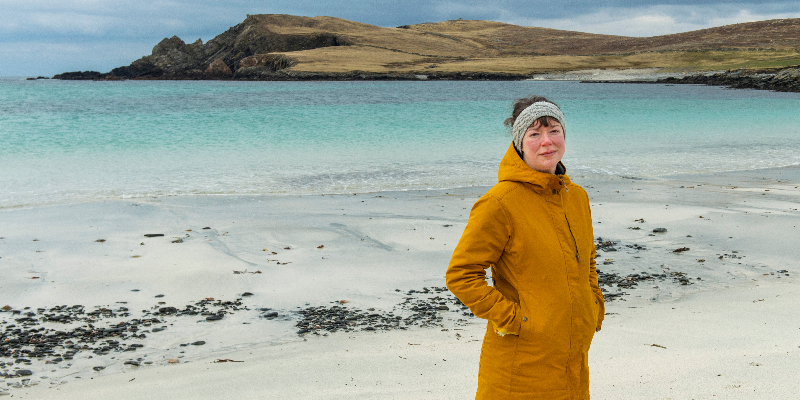Jen Hadfield on Annie Dillard’s Pilgrim at Tinker Creek
In Conversation for the Windham-Campbell Prizes Podcast
The Windham-Campbell Prizes Podcast features a series of conversations with past and present Windham-Campbell Prize winners about their favorite books and plays. Hosted by Michael Kelleher.
Jen Hadfield (winner of a 2024 Windham Campbell Prize for Poetry) joins Michael Kelleher to wade through Annie Dillard’s dense yet rewarding classic, Pilgrim at Tinker Creek. They discuss difficult reading experiences, poetic attempts to unlock the ineffable and immense, the book’s intense relationship to the natural world and how that has impacted Hadfield’s own work, and more.
For a full episode transcript, click here.
*
Reading list:
Pilgrim at Tinker Creek by Annie Dillard • Walden by Henry David Thoreau • Storm Pegs by Jen Hadfield • “An Transparent Eyeball” by Ralph Waldo Emerson
From the episode:
Jen Hadfield: Something I really like in Dillard is her obsession with the detail she talks about the fringed texture of the world quite a bit, the complexity of it and the raggedy nature of it. And those are, wounds that have been inflicted by nature itself upon itself. But they’re also. angles of extreme detail and complexity. And the thing that I really envy in her writing, and I like her fiction as well, is her genius for detail, for bringing what feels like a whole world to life on a page.
So she focuses on Tinker Creek, which in theory is finite and bounded: it’s a single place that she sets out to talk about in theory, although she does travague around, as folks say in Scots, but the detail that she conjures of that place makes you realize that the detail is infinite.
I just don’t know how she manages to hold it all in a book. And I think that’s what I’ve always wanted to do with my writing and my making. It’s why I’ve tried to cast puff balls and feral apples in porcelain. It’s trying to record the individual detail that nature throws out continually. But we can’t do it. We can’t do it as well as nature can. And that’s something that she captures really successfully, I think. You can’t believe you’re not at Tinker Creek with her, suffering these violences, and I wonder if that that detail and that richness is what makes it hard to get through at times.
Michael Kelleher: I agree. I’ve been thinking quite a lot over the last week about like what it is specifically that I struggled with, especially early on in this book, and I think that’s it. Part of it’s structure allows for her to embody the detail in her writing in such a way that it doesn’t feel structured, that you don’t at times feel led the way that you do often in a narrative, you, you feel like you’re, you are just being acted upon in the way that she is hoping to feel acted upon in nature. And I find that kind of unnerving, personally. I was joking with my wife, like, we go on hikes all the time and I was telling her like, I’m gonna hand this book to you when we’re done, ’cause when we go on hikes, she’s always stopping and like looking at the mushrooms and digging under stuff and I’m always like, but we gotta get to the top, you know?
JH: That’s a perfect metaphor for something I’ve been trying and failing to say for many years, I think, to my students mostly, which is that I think that poetry accesses universal things and abstract things and ineffable things through the key of detail. So you’re there looking at the big picture, the abstract ineffable mountain or whatever. It’s concrete and it’s there, but it’s massive. You can’t hold it in your arms, and your wife’s there poking at the mushroom gills or whatever. And I’d be the same. I’d be poking at the mushroom gills because it’s trying to make this immensity human sized.
That’s our key. That’s the only chance we have of unlocking the immensity. So poetry is scaled right down. You can hold it in your hand like a snow globe and shake it and maybe that’s how she’s trying to access this God that she wants to persuade us exists.
*
Jen Hadfield is a poet, bookmaker, and visual artist. She is the author of five books, including most recently Storm Pegs. Her second collection, Nigh-No-Place (2008) received the T. S. Eliot Prize. Hadfield earned her BA from the University of Edinburgh and MLitt in creative writing from the University of Strathclyde and the University of Glasgow. Her awards and honors include a Highland Books Prize (2022), an Edwin Morgan International Poetry Award (2012), the Dewar Award (2007) and an Eric Gregory Award (2003), as well as residencies with the Shetland Arts Trust and the Scottish Poetry Library. In 2014, she was named by the Poetry Book Society as one of twenty poets selected to represent the Next Generation of poets in the United Kingdom and Ireland. Hadfield currently lives in the Shetland Islands, where she is Reader in Residence at Shetland Library.
The Windham-Campbell Prizes Podcast is a program of The Windham-Campbell Prizes, which are administered by Yale University Library’s Beinecke Rare Book and Manuscript Library.




















